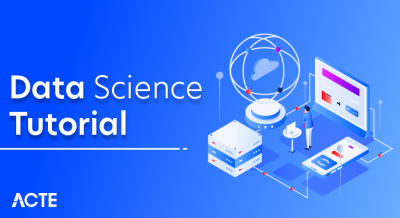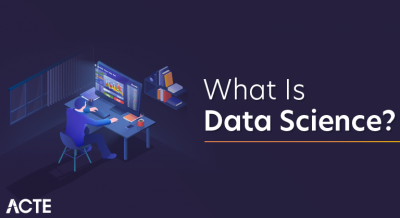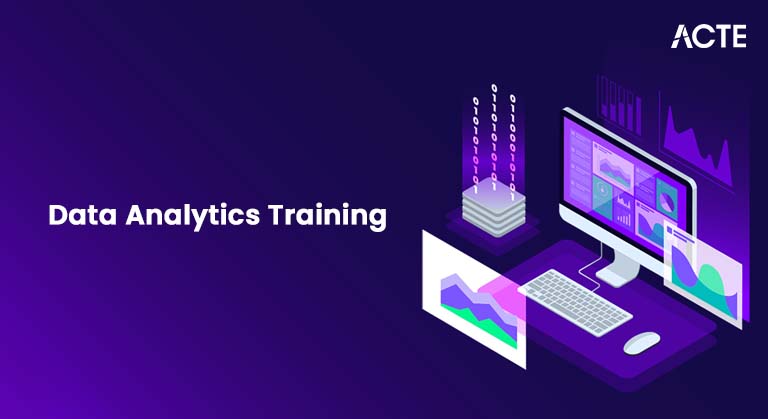
- Introduction to Data Analytics
- Growing Demand in the Job Market
- Skills You Learn in Training
- Hands-on Projects and Tools
- Real-time Data Problem Solving
- Boosting Resume and Career
- Opportunities Across Industries
- Certification After Training
Introduction to Data Analytics
Data analytics is the systematic process of collecting, organizing, and analyzing large volumes of data to uncover useful information, patterns, and trends that support decision-making. It integrates principles from statistics, computer science, and business intelligence to transform raw data into actionable insights. As organizations increasingly rely on data to drive strategies, data analytics has become essential across industries like finance, healthcare, marketing, and logistics. The process typically includes data collection, cleaning, analysis, visualization, and interpretation. Four main types of data analytics descriptive, diagnostic, predictive, and prescriptive help answer questions about what happened, why it happened, what is likely to happen, and what actions should be taken. Data Science Training equips individuals with the necessary skills to effectively perform these tasks, providing a comprehensive understanding of how to analyze and derive actionable insights from data. Common tools used in the field include Excel, SQL, Python, R, and visualization platforms like Tableau and Power BI. Mastering data analytics enables individuals and organizations to make informed, evidence-based decisions, optimize performance, and gain a competitive advantage. As data continues to grow in volume and complexity, the ability to interpret and utilize it effectively is more critical than ever. This introduction provides a foundation for understanding how data analytics works and why it plays a vital role in today’s data-driven world.
Would You Like to Know More About Data Science? Sign Up For Our Data Science Course Training Now!
Growing Demand in the Job Market
- High Demand Across Industries: Sectors such as finance, healthcare, retail, logistics, and tech are actively hiring data analysts to optimize operations and gain insights from data.
- Attractive Salary Packages: Due to the specialized skill set required, data analytics roles often offer competitive salaries and strong growth potential. An R Certification overview covers key skills in data manipulation, visualization, and statistical analysis using R, boosting your career prospects.
- Diverse Career Paths: Professionals can pursue various roles such as data analyst, business analyst, data scientist, or data engineer, each offering unique challenges and opportunities.
The demand for data analytics professionals has surged in recent years due to the exponential growth of data and the need for data-driven decision-making. Organizations are increasingly relying on skilled analysts to interpret complex data, forecast trends, and support strategic planning. This shift has created a wide range of career opportunities for individuals with strong analytical and technical skills.
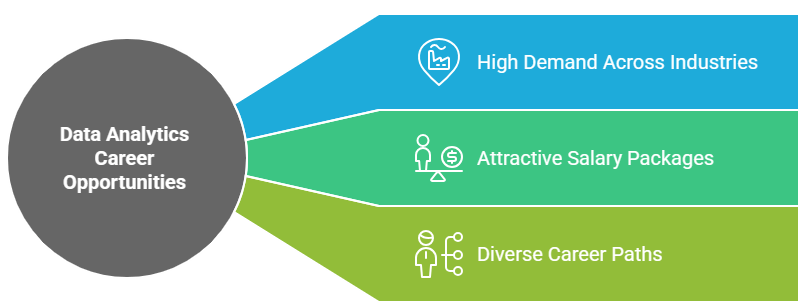
- Shortage of Skilled Talent: Despite the demand, there is a gap in the supply of qualified professionals, making skilled candidates highly sought-after.
- Opportunities for Remote Work: Many data analytics jobs offer flexibility, including remote or hybrid work arrangements, making them more accessible.
- Integration with Emerging Technologies: As AI, machine learning, and big data continue to grow, data analytics skills remain at the forefront of innovation and tech advancement.
Skills You Learn in Training
Data analytics training equips individuals with a robust set of technical and analytical skills essential for working with data effectively. One of the foundational skills learned is data collection and cleaning, which ensures the accuracy and quality of data before analysis. Trainees also gain proficiency in programming languages such as Python and R, which are widely used for data manipulation, statistical analysis, and automation. Knowledge of SQL is developed for querying databases, while skills in Excel support basic data handling and visualization. These are considered among the Best Data Science Programming Languages essential for building a strong foundation in the field. Training often includes learning to use powerful data visualization tools like Tableau or Power BI to create interactive dashboards and communicate insights. Statistical and mathematical techniques are also taught to help interpret data patterns and apply predictive models. Critical thinking and problem-solving are emphasized throughout the training, enabling learners to frame the right questions and make data-driven decisions. Additionally, training typically covers data storytelling, helping individuals present findings in a clear, persuasive manner for stakeholders. Soft skills such as collaboration and communication are also enhanced, preparing trainees to work effectively in cross-functional teams. Overall, data analytics training builds a well-rounded skill set that is both technically strong and business-focused, readying individuals for diverse roles in the industry.
Want to Pursue a Data Science Master’s Degree? Enroll For Data Science Masters Course Today!
Hands-on Projects and Tools
- Real-World Data Sets: Learners work with sets from domains like finance, healthcare, and e-commerce to solve business-relevant problems and understand industry contexts.
- Data Cleaning and Preprocessing: Using tools such as Python, R, and Excel, trainees learn to handle missing values, format data properly, and prepare it for analysis.
- Exploratory Data Analysis (EDA): Using tools like Jupyter Notebook and RStudio, learners explore data patterns and trends through stats and visuals. This practical approach helps answer What is Data Science by showing how data turns into insights.
- Database Management with SQL: SQL is used to extract, filter, and manipulate data from relational databases, helping learners build strong querying and data management skills.
- Data Visualization: Tools like Tableau and Power BI are used to create interactive dashboards and visual reports that communicate insights clearly and effectively.
- Capstone Project: A final, comprehensive project integrates all skills learned, requiring students to solve a complete data analytics problem from data collection to presentation.
- Industry-Recognized Skills: Training provides proficiency in high-demand tools like Python, SQL, Excel, Tableau, and Power BI, which are often listed as top requirements in job postings.
- Project Portfolio: Hands-on projects and capstone assignments can be showcased in a professional portfolio, demonstrating practical experience to potential employers.
- Certifications: Many programs offer certificates upon completion, adding credibility to your resume and validating your expertise to hiring managers. These programs may also touch on What is Data Engineering helping you understand how data is collected, stored, and prepared for analysis an essential part of the data science pipeline.
- Job-Ready Confidence: Training enhances your problem-solving and critical-thinking skills, preparing you to handle real business challenges from day one.
- Career Flexibility: The skills you gain open doors to various roles such as data analyst, business analyst, data engineer, and more across multiple industries.
- Networking Opportunities: Many training programs include access to industry mentors, peer groups, and job placement support, helping you build connections and land interviews.
Hands-on experience is a crucial part of data analytics training, allowing learners to apply their knowledge to real-world scenarios. These projects build practical skills, boost confidence, and prepare trainees for professional roles by using real datasets and industry-standard tools. Below are some key components typically included in the hands-on training process:
Real-time Data Problem Solving
Real-time data problem solving is a critical aspect of modern data analytics, focusing on the ability to analyze and respond to data as it is generated. In today’s fast-paced digital environment, businesses must make quick, informed decisions, and this requires systems and professionals capable of handling real-time data streams. Through training and practical experience, learners develop the skills to work with live data using tools like Apache Kafka, Spark Streaming, and real-time dashboards. They learn to process, analyze, and visualize data on the fly, identify patterns instantly, and provide immediate insights for time-sensitive decision-making. Real-time problem solving also involves monitoring key performance indicators (KPIs), detecting anomalies, and reacting to unexpected changes in business conditions or user behavior. Data Science Training prepares professionals to leverage advanced analytics techniques to effectively monitor, detect, and respond to these changes, ensuring timely and data-driven decision-making in dynamic environments. This capability is especially valuable in industries like finance, e-commerce, healthcare, and cybersecurity, where rapid responses can prevent losses or improve outcomes. Training often includes simulated real-time scenarios where learners must troubleshoot issues, interpret evolving data, and suggest actionable solutions within strict timeframes. Mastery of real-time data problem solving enhances an analyst’s ability to add immediate value, ensuring businesses stay agile, competitive, and responsive in a data-driven world. It transforms data analytics from a reactive process to a proactive, dynamic capability.
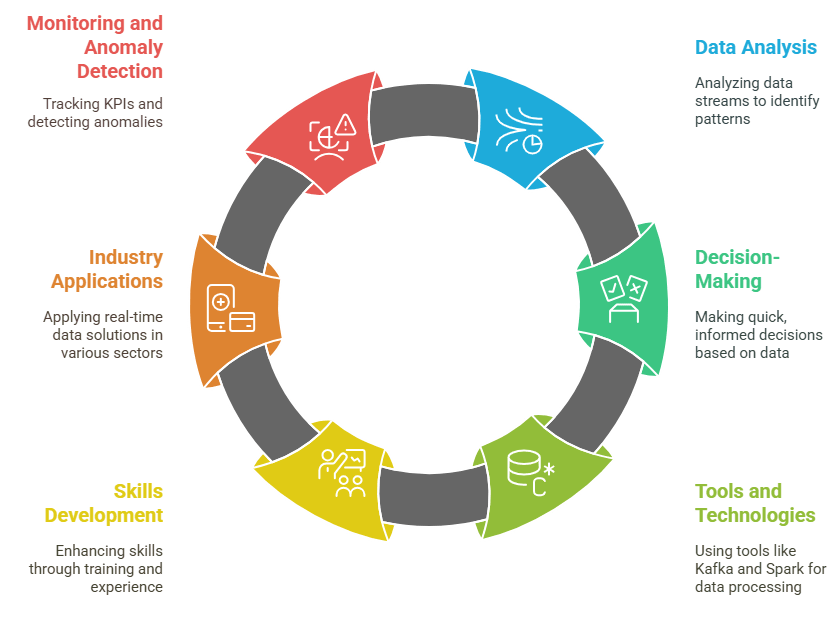
Boosting Resume and Career
Completing data analytics training not only equips learners with valuable skills but also significantly enhances their professional profiles. With hands-on experience, industry-relevant tools, and real-world projects under their belt, individuals can build a resume that stands out in a competitive job market. Here are six ways data analytics training helps boost your resume and advance your career:
Opportunities Across Industries
Data analytics has become a pivotal force across a wide range of industries, offering diverse career opportunities for skilled professionals. As organizations increasingly rely on data-driven insights, the demand for data analysts, data scientists, and business intelligence experts has expanded beyond traditional tech companies. In industries like healthcare, data analytics is used to improve patient care, optimize operations, and predict disease trends. In finance, analysts help institutions forecast market conditions, assess risks, and optimize investment strategies. Retailers leverage data to personalize customer experiences, manage inventory, and predict consumer behavior, while in manufacturing, data analytics improves supply chain efficiency, predictive maintenance, and production processes. These applications highlight the Essential Data Analyst Skills such as data interpretation, statistical analysis, and problem-solving, which are critical across industries. The public sector, including government agencies, uses data to improve service delivery, enhance policy-making, and ensure better governance. Even in entertainment, sports, and media, data analytics plays a key role in understanding consumer preferences, enhancing fan experiences, and optimizing content delivery. Furthermore, the rise of big data, machine learning, and artificial intelligence in sectors like transportation and logistics is creating new opportunities for data professionals. This widespread integration of data analytics across industries highlights its versatility and the growing demand for expertise, making it a rewarding field for professionals seeking diverse career paths in the modern workforce.
Go Through These Data Science Interview Questions & Answer to Excel in Your Upcoming Interview.
Certification After Training
Earning a certification after completing data analytics training can significantly enhance your professional profile and open doors to career advancement. Certifications serve as tangible proof of the skills and knowledge you’ve gained during training, making your qualifications more visible to potential employers. They not only validate your expertise in data analysis tools like SQL, Python, R, and data visualization platforms but also demonstrate your commitment to continuous learning and professional development through Data Science Training. This training enhances your ability to apply advanced data science techniques and stay updated with the latest trends and technologies in the field. Many industry-recognized certifications, such as those offered by Google, Microsoft, or Tableau, are highly regarded in the field and can increase your credibility in the job market. These certifications give you a competitive edge, as they indicate that you have acquired up-to-date, relevant skills that meet the current demands of the industry. They also enhance your chances of securing higher-paying roles, as companies often seek certified professionals to fill specialized positions. Moreover, certifications can help you stand out in a crowded job market, boosting your confidence and showing potential employers that you are fully capable of contributing to their data-driven objectives. Whether it’s a beginner-level certificate or an advanced specialization, obtaining certification after training solidifies your readiness for real-world data challenges and career success.


